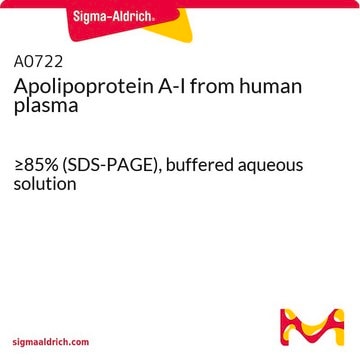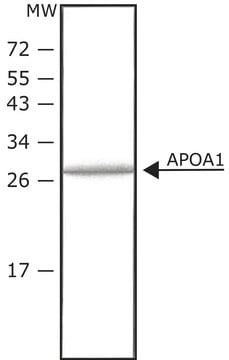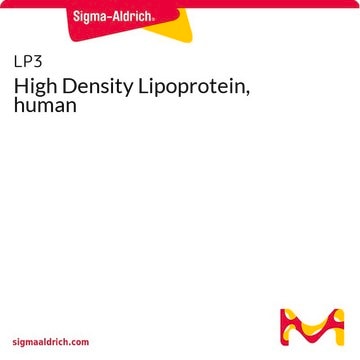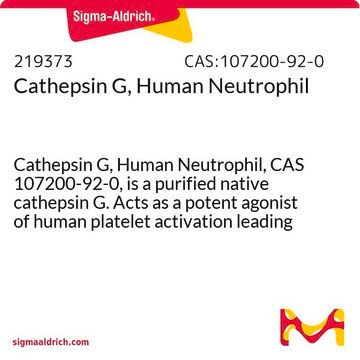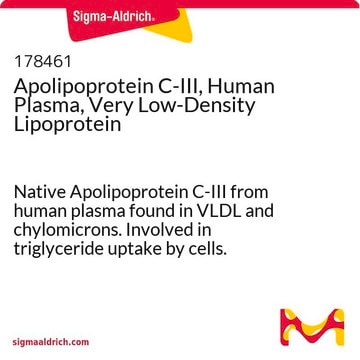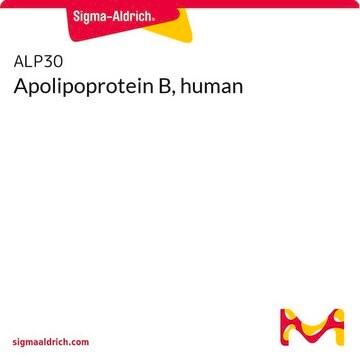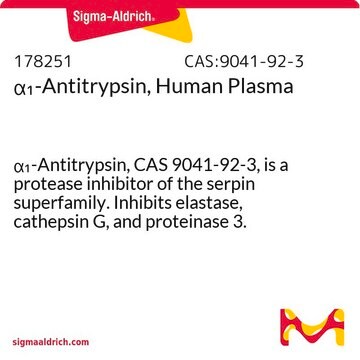178452
Apolipoprotein A-I, Human Plasma, High-Density Lipoprotein
Native apolipoprotein A-I from human plasma. Functions as a cofactor for lecithin-cholesterol acyltransferase. A component of high density lipoprotein.
Synonym(s):
Apo A-I
Sign Into View Organizational & Contract Pricing
All Photos(1)
About This Item
UNSPSC Code:
12352202
NACRES:
NA.25
Recommended Products
Quality Level
Assay
≥95% (SDS-PAGE)
form
liquid
manufacturer/tradename
Calbiochem®
storage condition
OK to freeze
avoid repeated freeze/thaw cycles
shipped in
wet ice
storage temp.
−20°C
General description
Functions as a cofactor of lecithin cholesterol acyltransferase (LCAT).
Native apolipoprotein A-I from human plasma. Functions as a cofactor for lecithin-cholesterol acyltransferase (LCAT). Plays an important role in HDL metabolism.
Packaging
Please refer to vial label for lot-specific concentration.
Warning
Toxicity: Standard Handling (A)
Physical form
In 10 mM NH₄HCO₃, pH 7.4.
Preparation Note
Prepared from plasma that has been shown by certified tests to be negative for HBsAg and for antibodies to HIV and HCV.
Reconstitution
Following initial thaw, aliquot and freeze (-20°C). Store at a concentration ≥1 mg/ml.
Other Notes
Bergot, C., et al. 2001. Eur. J. Biochem.268, 3523.
Pászty, C., et al. 1994. J. Clin. Invest.94, 899.
Breslow, J.L. 1993. Proc. Natl. Acad. Sci. USA90, 8314.
Schultz, J.R., et al. 1992. J. Biol. Chem.267, 21630.
Walsh, A., et al. 1989. J. Biol. Chem.264, 6488.
Brewer, H.B. 1986. Methods Enzymol. 128, 223.
Pászty, C., et al. 1994. J. Clin. Invest.94, 899.
Breslow, J.L. 1993. Proc. Natl. Acad. Sci. USA90, 8314.
Schultz, J.R., et al. 1992. J. Biol. Chem.267, 21630.
Walsh, A., et al. 1989. J. Biol. Chem.264, 6488.
Brewer, H.B. 1986. Methods Enzymol. 128, 223.
Legal Information
CALBIOCHEM is a registered trademark of Merck KGaA, Darmstadt, Germany
Disclaimer
RESEARCH USE ONLY. This product is regulated in France when intended to be used for scientific purposes, including for import and export activities (Article L 1211-1 paragraph 2 of the Public Health Code). The purchaser (i.e. enduser) is required to obtain an import authorization from the France Ministry of Research referred in the Article L1245-5-1 II. of Public Health Code. By ordering this product, you are confirming that you have obtained the proper import authorization.
Storage Class Code
11 - Combustible Solids
WGK
WGK 1
Flash Point(F)
Not applicable
Flash Point(C)
Not applicable
Certificates of Analysis (COA)
Search for Certificates of Analysis (COA) by entering the products Lot/Batch Number. Lot and Batch Numbers can be found on a product’s label following the words ‘Lot’ or ‘Batch’.
Already Own This Product?
Find documentation for the products that you have recently purchased in the Document Library.
Remco Franssen et al.
Cholesterol, 2012, 610741-610741 (2012-05-23)
HDL provides atheroprotection by facilitating cholesterol efflex from lipid-laden macrophages in the vessel wall. In vitro studies have suggested impaired efflux capacity of HDL following inflammatory changes. We assessed the impact of acute severe sepsis and mild chronic inflammatory disease
Mengxi Wang et al.
Oxidative medicine and cellular longevity, 2022, 2226168-2226168 (2022-12-16)
At present, due to the limitations of drug therapy targets for atherosclerosis, some patients fail to achieve satisfactory efficacy. Cholesterol efflux dysfunction and endothelial cell inflammation are considered to be important factors in the development of atherosclerosis. Peroxisome proliferator-activated receptor
Sanne J C M Frambach et al.
Life sciences, 300, 120571-120571 (2022-04-27)
Mitochondrial complex I (CI), the first multiprotein enzyme complex of the oxidative phosphorylation system, plays a crucial role in cellular energy production. CI deficiency is associated with a variety of clinical phenotypes, including Leigh syndrome. At the cellular level, an
Sylwia Wasiak et al.
Data in brief, 8, 1280-1288 (2016-08-30)
Apabetalone (RVX-208) inhibits the interaction between epigenetic regulators known as bromodomain and extraterminal (BET) proteins and acetyl-lysine marks on histone tails. Data presented here supports the manuscript published in Atherosclerosis "RVX-208, a BET-inhibitor for Treating Atherosclerotic Cardiovascular Disease, Raises ApoA-I/HDL
Dean Gilham et al.
Atherosclerosis, 247, 48-57 (2016-02-13)
High density lipoproteins (HDL), through activity of the main protein component apolipoprotein A-I (ApoA-I), can reduce the risk of cardiovascular disease (CVD) by removing excess cholesterol from atherosclerotic plaque. In this study, we demonstrate that the bromodomain and extraterminal domain
Our team of scientists has experience in all areas of research including Life Science, Material Science, Chemical Synthesis, Chromatography, Analytical and many others.
Contact Technical Service